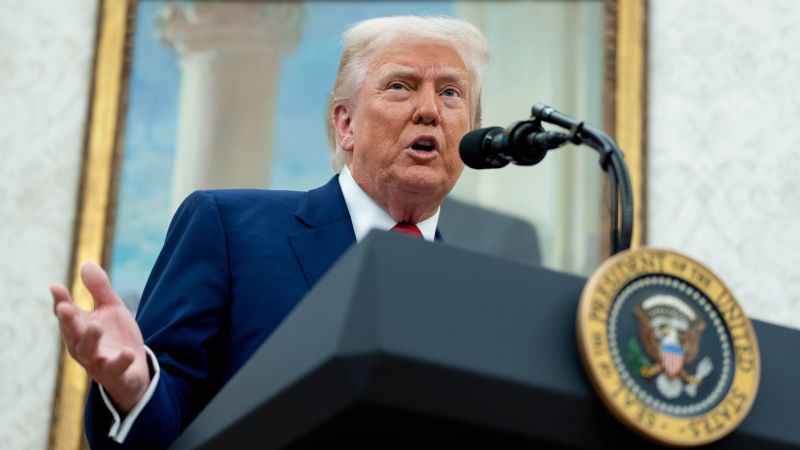On a Wednesday afternoon, President Donald Trump found himself faced with a surprisingly critical question from a reporter regarding his tariffs, which provoked a defensive response from the president. The reporter introduced a new acronym, TACO, signifying “Trump Always Chickens Out,” a phrase that had evidently not yet crossed Trump’s ears. According to a senior White House official, the president was taken aback by the term, expressing confusion and frustration as he labeled the inquiry “the nastiest question” he had received.
It became evident that Trump misinterpreted the term TACO. An official explained that the president believed the reporter was directly accusing him of cowardice, which understandably incited a level of annoyance. His reaction reflected a deeper sensitivity to how his tariff policies are perceived, showcasing that the characterization of his strategy as one of retreat does not sit well with him. Following this exchange, Trump’s discontent lingered, as he expressed his frustration to his inner circle about not being briefed on TACO’s emergence in popular discourse.
The creation of the term TACO traces back to a column by Robert Armstrong, a Financial Times columnist, who articulated this concept in early May. Armstrong’s objective was to encapsulate the perception that Trump often reverses his more aggressive tariff threats. The acronym gained traction in financial districts, particularly among traders, who recognized that instead of panicking over Trump’s rhetoric, evaluating his history of backing down might be more prudent. Armstrong’s analysis suggested that Trump’s frequent renegotiations typically led to stock markets recovering swiftly after downturns triggered by his more extreme proclamations.
While Trump has exhibited fluctuating tariff positions over the last week, such as threatening a staggering 50% tariff on European goods, and later imposing and retracting significant tariffs on Chinese imports, his negotiatory dance remains central to his strategy. He justifies these tactics as a deliberate approach to trade negotiations, emphasizing the need to set high expectations to secure concessions from other nations. His belief is that such tactics, which he frames as strategic negotiation rather than weakness, reflect his robust approach to deal-making.
Observers close to the situation noted that Trump’s irritation stemmed from a disconnect between his views on negotiation’s intricacies and how they are interpreted by others. It demonstrated that he perceives his negotiating style not as a sign of frailty, but rather as an essential tool in international bargaining. Given this reality, it isn’t surprising that he reacted sharply to the implications of the TACO acronym.
The rise of the term TACO in the economic lexicon illustrates not only the dynamics of financial markets but also how quickly phrases can evolve within the information ecosystem. Armstrong, who aimed to critique the economic ramifications of Trump’s tariff threats, stumbled upon an unforeseen outcome. The acronym proliferated across finance-focused social media platforms, sparked humor among analysts, and found its way into everyday conversations on Wall Street.
This furor illustrates a broader commentary on the interplay between social media and political discourse, evoking the layered and often unpredictable nature of public perception surrounding the presidency. Armstrong himself expressed bemusement over how quickly TACO caught on, underscoring the capricious nature of language in a fast-paced media landscape. Ultimately, he hoped the term would not correlate with any substantive shift in Trump’s approach to tariffs.
In the end, Trump reaffirmed his conceptualization of these negotiations, countering the TACO framing during his exchange by clarifying that he does not see himself as “chickening out,” but rather engaging in negotiation. He asserted that any perceived retreat is indeed part of a strategic maneuvering process in trade relations, illustrating his steadfast belief in the necessity of projecting strength during negotiations, even if it means facing criticism for perceived inconsistency in tariff implementations.



